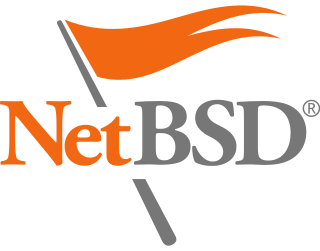
AIX is a series of proprietary Unix operating systems developed and sold by IBM for several of its computer platforms. Originally released for the IBM RT PC RISC workstation, AIX now supports or has supported a wide variety of hardware platforms, including the IBM RS/6000 series and later POWER and PowerPC-based systems, IBM System i, System/370 mainframes, PS/2 personal computers, and the Apple Network Server.
The Internet protocol suite is the conceptual model and set of communications protocols used in the Internet and similar computer networks. It is commonly known as TCP/IP because the foundational protocols in the suite are the Transmission Control Protocol (TCP) and the Internet Protocol (IP). During its development, versions of it were known as the Department of Defense (DoD) model because the development of the networking method was funded by the United States Department of Defense through DARPA. Its implementation is a protocol stack.
The Single UNIX Specification (SUS) is the collective name of a family of standards for computer operating systems, compliance with which is required to qualify for using the "UNIX" trademark. The core specifications of the SUS are developed and maintained by the Austin Group, which is a joint working group of IEEE, ISO JTC 1 SC22 and The Open Group. If an operating system is submitted to The Open Group for certification, and passes conformance tests, then it is deemed to be compliant with a UNIX standard such as UNIX 98 or UNIX 03.
Berkeley sockets is an application programming interface (API) for Internet sockets and Unix domain sockets, used for inter-process communication (IPC). It is commonly implemented as a library of linkable modules. It originated with the 4.2BSD Unix operating system, released in 1983.
In computing, the Windows Sockets API (WSA), later shortened to Winsock, is a technical specification that defines how Windows network software should access network services, especially TCP/IP. It defines a standard interface between a Windows TCP/IP client application and the underlying TCP/IP protocol stack. The nomenclature is based on the Berkeley sockets API model used in BSD for communications between programs.
Open Transport was the name given by Apple Inc. to its implementation of the Unix-originated System V STREAMS networking stack. Based on code licensed from Mentat's Portable Streams product, Open Transport was built to provide the classic Mac OS with a modern TCP/IP implementation, replacing MacTCP. Apple also added its own implementation of AppleTalk to the stack to support legacy networks.

UnixWare is a Unix operating system. It was originally released by Univel, a jointly owned venture of AT&T's Unix System Laboratories (USL) and Novell. It was then taken over by Novell. Via Santa Cruz Operation (SCO), it went on to Caldera Systems, Caldera International, and The SCO Group before it was sold to UnXis. UnixWare is typically deployed as a server rather than a desktop. Binary distributions of UnixWare are available for x86 architecture computers. UnixWare is primarily marketed as a server operating system.
The Berkeley r-commands are a suite of computer programs designed to enable users of one Unix system to log in or issue commands to another Unix computer via TCP/IP computer network. The r-commands were developed in 1982 by the Computer Systems Research Group at the University of California, Berkeley, based on an early implementation of TCP/IP.
In computer networking, STREAMS is the native framework in Unix System V for implementing character device drivers, network protocols, and inter-process communication. In this framework, a stream is a chain of coroutines that pass messages between a program and a device driver. STREAMS originated in Version 8 Research Unix, as Streams.
A network socket is an internal endpoint for sending or receiving data within a node on a computer network. Concretely, it is a representation of this endpoint in networking software, such as an entry in a table, and is a form of system resource.
A Unix domain socket or IPC socket is a data communications endpoint for exchanging data between processes executing on the same host operating system. Valid socket types in the UNIX domain are:

Packeteer, founded in 1996 by Robert Packer and Brett Galloway, was an I.T. company based in Cupertino, California that was listed on the NASDAQ. Networking appliances focus on Application Traffic Management and optimization for wide area networks. They held at least 40 patents for various network optimization methods. Packeteer was acquired by Blue Coat Systems in 2008.
The Berkeley Software Distribution (BSD) was an operating system based on Research Unix, developed and distributed by the Computer Systems Research Group (CSRG) at the University of California, Berkeley. Today, "BSD" often refers to its descendants, such as FreeBSD, OpenBSD, NetBSD, or DragonFly BSD, and systems based on those descendants.
Windows NT is a family of operating systems produced by Microsoft, the first version of which was released on July 27, 1993. It is a processor-independent, multiprocessing and multi-user operating system.

Unix is a family of multitasking, multiuser computer operating systems that derive from the original AT&T Unix, development starting in the 1970s at the Bell Labs research center by Ken Thompson, Dennis Ritchie, and others.

OpenSSH is a suite of secure networking utilities based on the Secure Shell (SSH) protocol, which provides a secure channel over an unsecured network in a client–server architecture.

NetBSD is a free and open-source Unix-like operating system based on the Berkeley Software Distribution (BSD). It was the first open-source BSD descendant officially released after 386BSD was forked. It continues to be actively developed and is available for many platforms, including servers, desktops, handheld devices, and embedded systems.
The Stream Control Transmission Protocol (SCTP) is a computer networking communications protocol which operates at the transport layer and serves a role similar to the popular protocols TCP and UDP. It is standardized by IETF in RFC 4960.
QUIC is a general-purpose transport layer network protocol initially designed by Jim Roskind at Google, implemented, and deployed in 2012, announced publicly in 2013 as experimentation broadened, and described to the IETF. While still an Internet Draft, QUIC is used by more than half of all connections from the Chrome web browser to Google's servers. Microsoft EDGE browser supports QUIC, Firefox supports it in their nightly builds.





